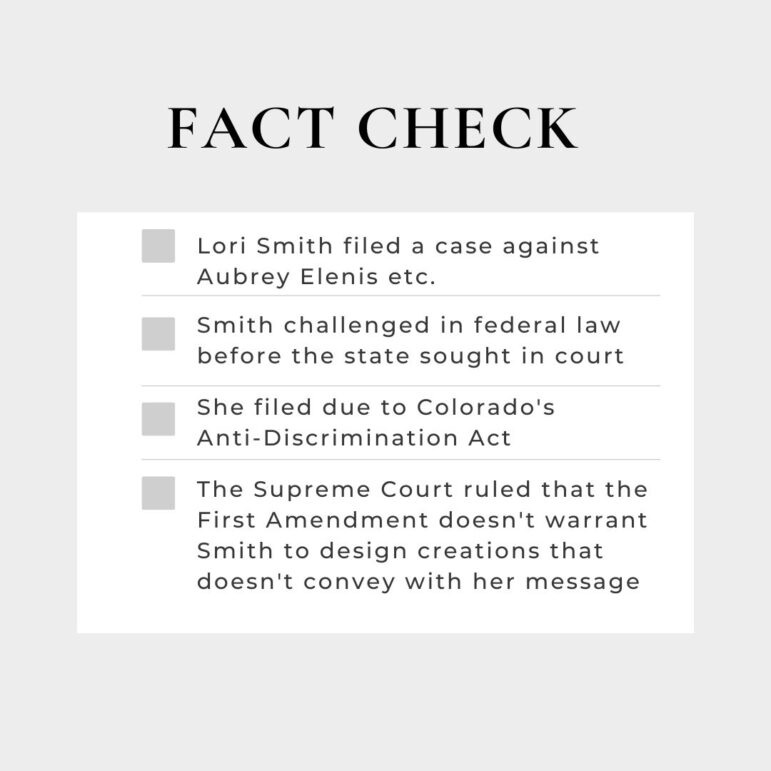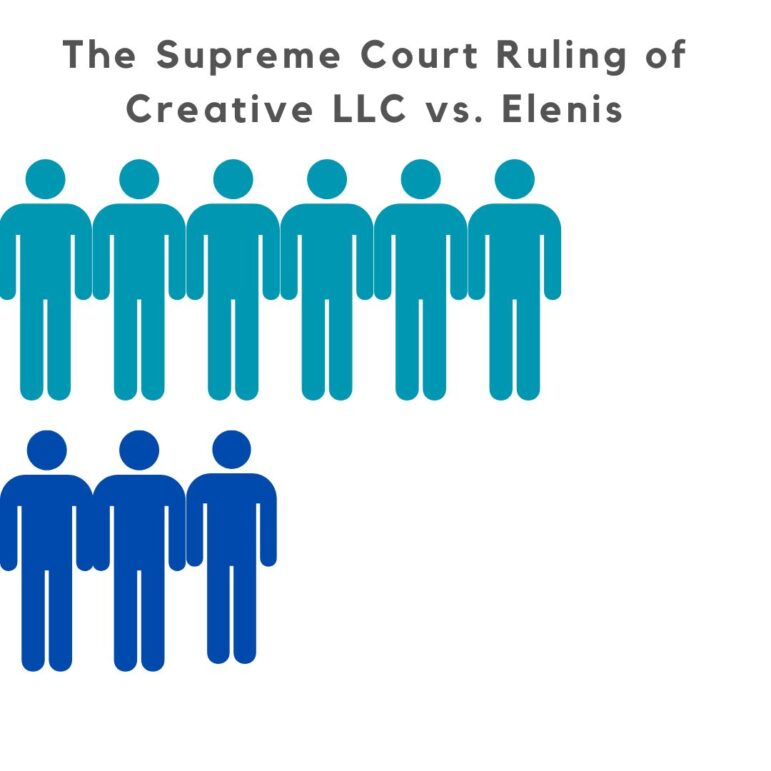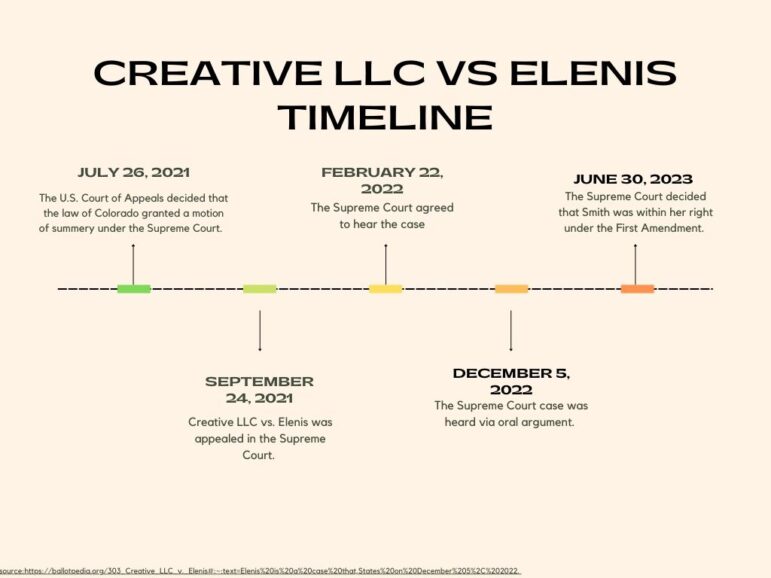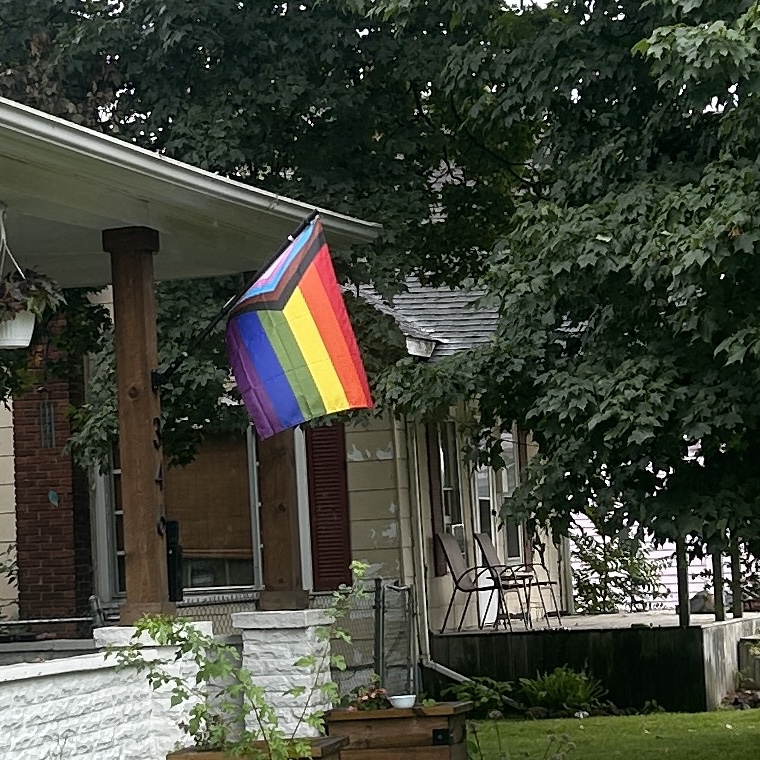When the Supreme Court ruled that Lori Smith, a website designer from Colorado, could deny her services to those of the LGBTQ+, it was unclear how the decision would affect LGBTQ+ clients nationwide. But Fenton resident Ky Orvis wasn’t too worried — yet.
“Specifically in Fenton, I don’t see it foreseeing it being a problem,” said Orvis, the president of the Fenton Pride Collective. “The concern of a lot of people, not just in Fenton, not just in Michigan, but across the U.S. is like what does this set the precedent of and justify discrimination against a class of people.”
The ruling is sparking controversy as to what this means for groups, such as minorities and LGBTQ+, and raises concerns for those it affects.
“Why does this exist? Why is there racism still? Why is there hate speech and discriminatory acts?” said Orvis. “Still, I don’t think it’s ever really going to go away, or at least not for a while. I think part of that is just kind of like the generational gap.”
Orvis said there are many ways that community members can take action after this ruling if they feel they need to.
“The big thing is: don’t just talk on social media, don’t just repost things,” said Orvis. “Do something about it. You can. There’s a million things you can do, help out your local organizations, like your LGBTQ+ groups and women’s rights groups, etc.”

Hannah Young
Supreme Court Justice Sonia Sotomayor, with Justice Elena Kagan and Justice Ketanji Brown Jackson, dissented an opinion stating, “…the Court, for the first time in its history, grants
a business open to the public a constitutional right to refuse to serve members of a protected class.”
SCOTUS Justices dissented their opinion against the majority of the court. They explained their beliefs but also how this ruling can affect citizens of certain groups.
“The business argues, and a majority of the Court agrees, that because the business offers services that are customized and expressive, the Free Speech Clause of the First Amendment shields the business from a generally applicable law that prohibits discrimination in the sale of publicly available goods and services.”

Hannah Young
Larry Martin, professor of economics at Michigan State University, gave insight into what this could mean for businesses and their rights. Martin has also taught law.
“The common law works by disputes,” said Martin. “So people have disputes like this web page designer and the customer has a dispute about whether she is compelled to offer her services. The Supreme Court makes a judgment, and then that becomes a precedent, and if it’s used as a precedent for future cases, it grows stronger and things get modified and lines get drawn.”
Martin believes that these types of disputes will keep coming in the future. These types of cases will become more apparent.
“Then there will be lines drawn and criteria to decide when the seller has this right and when the seller doesn’t,” said Martin.
Martin illustrated how and why this case ruled in favor of Smith to refuse the right to same-sex couples.
Martin said: “Racial or ethnic or religious reason then I don’t think she’d ever win that case but the Supreme Court found something in services where they claim that it’s where the judgment is that there’s a speech involved, so in supplying her services she has to speak a certain way, cause she has to write, she has to make the web page celebrate things that she doesn’t believe.”
Frank Ravitch, an MSU law professor who specializes in religion and interpretive theory, said he thinks that this case is a standard free speech decision.
“One, you’ve got the state anti-discrimination law, that’s still good law,” said Ravitch. “But what they’re saying is if that anti-discrimination law was applied to require someone to engage in compelled speech, the free speech clause would provide a defense to that.”
Ravitch also said that this case is consistent with the free speech clause and goes against Smith’s right.
“The problem with the case is it’s a relatively standard application of free speech doctrine,” said Ravitch. “ If free speech is going to protect this kind of a speaker even if it’s a company that could be found liable under anti-discrimination laws. What happens when it’s less clear speech?”
Ravitch clarifies that this case is a standard free speech case where Smith was trying to protect her first amendment rights within her creative expression of the company, Creative 303 LLC.
“A state can’t punish somebody who’s engaged in a clearly creative endeavor for refusing to apply their creative skills,” said Ravitch. “A context that they don’t want to apply their creative skills to.”
Ravtich said that this ruling can lead to similar cases in the future.
“I think we’re going to start seeing more and more free speech cases,” said Ravitch. “People on that side of things I think are going to start trying to bring cases like Masterpiece, the Baker case, or they’re going to try…a free speech claim in that case too.”

Hannah Young
Geoffrey Johns, treasurer of the Salus Center in Lansing, said that it is hard to put into words because Michigan isn’t directly affected by it but there is a sense within the nation.
“When rights are curtailed, when people are divided into groups and given special privileges to some and not to others, that can be very demoralizing for a community,” said Johns. “…That doesn’t mean that we’re going to be safe in the long run. And I do think that we should be concerned about it.”
Johns works at a nonprofit organization in Lansing that specializes in the LGBTQ+ community and creating a safe space for those. Johns said that this ruling was on the basis of the First Amendment rights but there’s a difference between personal rights and serving a niche community.
“There’s a difference between all of those things, and discriminating against particular communities, especially a marginalized community,” said Johns. “So for example, First Amendment rights are meant to ensure that the individual has freedoms. When we start to say that some folks don’t have freedoms, that’s a whole different ball of wax.”
Johns said that Smith was well within her rights to do what she wants with her business, especially within the First Amendment rights. Johns said that the “crux of the argument” is the feeling of discrimination in who she serves.
“If she wants to serve particular communities, she can say I serve this specific church community in very much the same way that Salus Center serves a niche community of queer,” said Johns. “Salus, however, does not go on to say straight people are not welcome. …Because in our view that or at least in my view would be discrimination.”
